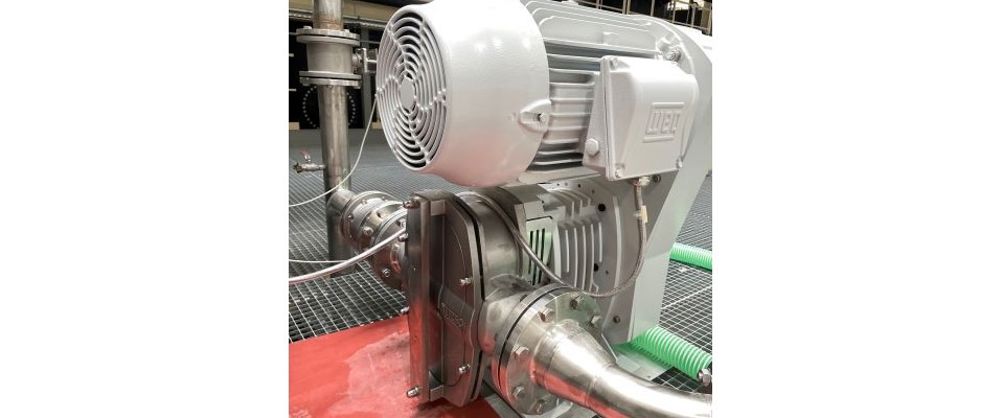Quality and efficiency - to guarantee both, precision in the handling of fluids is crucial in the chemical industry. This was also the case at a long-standing German chemical plant, which faced particular challenges when homogenizing gel chunks of different sizes. The aim was to generate a steady flow with a uniform particle size. This challenging task required a customised solution considering the medium‘s sensitivity.
Using an innovative, customer specific solution from Netzsch Pumps & Systems, the manufacturing process was optimized regarding quality, duration, and costs. Today, the chemical plant benefits from a high degree of flexibility in production and can offer a wide range of high quality gels.
As an expert in producing inorganic speciality chemicals, the company manufactures high-quality materials for users in various industries, including hydrogel. It is used to produce silica gel, typically used in the protein stabilization of beer, as a matting agent in paints and varnishes, or as a coating for inkjet paper.
Tension
This requires the hydrogel lumps, up to 30 mm in size, to be crushed in a defined manner so that a steady flow of uniform particle size can be realized. Like in any process in the chemical industry, efficiency and product quality take centre stage.
The material must be handled precisely and gently to achieve the desired particle size without damaging the product. Because the hydrogel is shear-sensitive, the manufacturing process is characterized by a tension between optimal results and the destruction of the product through shear forces. To counterbalance this, the shear rate must be controlled and homogenization monitored. Consistent and uniformly sized particles, essential for the downstream decanter process, can only be produced with suitable technology.
Conveying complex media
This process was initially based on an energy intensive thermal drying method at the chemical plant. In addition to the high operating costs, this led to unsatisfactory particle consistency and quality results.
Therefore, it was decided to work with Netzsch to realize an innovative pump system tailored to the application‘s requirements. As a global specialist in conveying complex media with more than seven decades of experience, Netzsch offers customized and sophisticated pump solutions for every individual application. Netzsch‘s quality and performance standards are high – not only in the development and production of pumps but also in maintenance, repair and modernization. The focus always lies on providing customers with expert advice. Ultimately, the aim is to use a wide range of technologies in a targeted manner to solve specific challenges to maximize customer satisfaction.
This also includes the opportunity to test solutions and, if necessary, adapt them until they fit the specific application. “We really appreciate the fact that we had the opportunity to test the system in advance. This was a deciding factor for us when selecting the supplier,” reported a project manager from the chemical plant. Short communication channels and fast response times from all stakeholders meant a suitable approach could be designed within three months.
Customized system solution

As a result, a system was developed for the industrial company combining two types of positive displacement pumps: The Nemo progressing cavity pump and a specially adapted Tornado rotary lobe pump. The Nemo pump draws the hydrogel from the storage containers, ensures a continuous flow and transports the medium to the Tornado.
There, homogenization is done by two counterrotating circular rotors, which reduce the medium to smaller pieces. The rotors are set to a defined gap and thus significantly determine the particle size. Afterwards, the gel is dried in a chamber filter press. This combination is unique because the rotary lobe pump has been precisely optimized for this application.
It functions as a shearing unit and macerator, where the material is homogenized. Special toothed pistons with a machined surface and customized gap spacing ensure minimal pressure loss.

Uniformity with flexibility
The synergy between the upstream Nemo pump and the Tornado ensures an optimized process guaranteeing a uniform particle size and even conveying of the shear-sensitive medium. All materials and technologies are used to provide high chemical resistance. CIP and SIP processes are considered, dead spaces are eliminated, and food-compliant surface quality and finish are guaranteed.
But that‘s not all: using the new technology, the chemical plant can adapt the operation of the machine depending on the product characteristics.
Both the direction of rotation and the speed can be selected manually – an entirely new level of control and flexibility in process management. This opens up additional possibilities in the product portfolio, as the entire range of silica gels with different product properties can be covered.
Complex requirements
The combined use of the two Netzsch pumps has proven to be a win-win situation for the medium sized family business. “The throughput and quality meet our expectations, and we were also impressed by the support and advice we received from Netzsch,” explained the project manager.
The project is a vivid example of customized pump solutions for Stefan Baudner, Area Sales Manager at Netzsch Pumps & Systems. “It shows how important customized and flexible process solutions are in modern industry to meet our customers specific requirements,” said Baudner. “With “Proven Excellence”, which is recognized in the industry, we at Netzsch are once again demonstrating our ability to solve even the most complex industrial requirements with innovative concepts.”
About the author
This article was written by Stefan Baudner, area sales manager at Netzsch Pumps & Systems.







